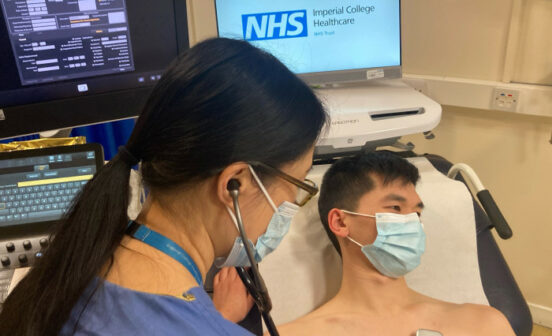PPIE Understanding Dilated Cardiomyopathy and Transforming Heart Failure Prospects taking into account patient perspectives

Dilated cardiomyopathy, a leading cause of heart failure in young individuals, presents a unique set of challenges and implications. It is an intrinsic heart muscle disease that is the most common reason for needing a heart transplant. Dr Brian Halliday, a Clinical Senior Lecturer and British Heart Foundation Intermediate Fellow at the National Heart and Lung Institute (NHLI) sheds light on this disease and how medical advancements have enabled some patients to go into remission.
Heart failure can be a devastating diagnosis. The prognosis has been shown to be worse than many common types of cancers. The words themselves often create a sense of doom for patients. Dilated cardiomyopathy- where the heart becomes baggy and weak, may be due to genetic susceptibility, extrinsic acquired triggers that put the heart under stress, or a combination of the two. At the NHLI we have a particular interest in dilated cardiomyopathy.
Over the last 30 years, medical science has made tremendous advances in treating heart failure. Treating a typical 55-year-old patient with comprehensive medical therapy will add an average of 6 years to their lives. The news is even better for many patients with dilated cardiomyopathy who have a greater chance of responding to therapy compared to those with other forms of heart failure.
Work from Dr Dan Hammersley, a research fellow at NHLI, and Professor Sanjay Prasad has shown that around two-thirds of patients with newly diagnosed dilated cardiomyopathy will have significant improvements in their heart function in the first year after diagnosis. Many will go on to have complete resolution of their symptoms and their heart function may return to normal.
It has not been clear whether this degree of improvement represents complete recovery from cardiomyopathy or whether this simply reflects a form of ‘heart failure remission’. Patients often return to clinic and ask whether they need to continue all or any of their medications. They often feel back to normal and are worried about the impact or risk of side effects. Taking medications may reduce their overall quality of life and they frequently want to stop medications.
A few years ago, a small trial, TRED-HF trial, was designed in an attempt to find answers to some of these questions. The study included 50 patients previously diagnosed with dilated cardiomyopathy, all of whom experienced complete improvement in cardiac function and resolution of symptoms. Half of the patients gradually stopped their medication and the other half continued.
The researchers expected to see a small number of patients experience changes in their heart function, but 40% of patients had a relapse of their cardiomyopathy after stopping therapy compared to none who stayed on therapy. They now suspect many more would have had a relapse if we had waited longer.
This small trial confirmed that the majority of these patients have a form of heart failure remission and typically require some medications to maintain it. After the trial, colleagues from the Patient Experience Research Centre interviewed participants to gather their perspectives. Some focus groups with patients and Cardiomyopathy UK, a charity that supports patients and their families, were also organised.
Patients expressed that they want more research investigating the types and amount of medication that best maintains heart failure remission. To steal analogies from the cancer world – a form of maintenance therapy, that not only minimises the risk of relapse but also side effects and impact on quality of life. This led to the birth of two more trials investigating the feasibility of tailoring the therapy required to maintain remission.
The work with patients has been crucial as it has ensured that the best questions were answered most appropriately. Doctors sometimes underestimate the impact of taking medications on patients. It is easy to tell patients to take another medication in the hope that it might improve the number of scan reports. However, patients explained that taking several medications every day for the rest of their lives has a significant impact on their well-being. Some describe it as a daily reminder of the cloud floating over their head that follows them around. They view being able to tailor their treatment regime once heart failure remission is achieved as a success.
Starting (and stopping) medications is a decision that should be shared by the patient and their doctor – each with uniquely important roles. Ideally, a doctor should provide expert insight into the possible risks and benefits of therapies, as well as any uncertainties. The patient can then make informed decisions considering their life context and priorities for the future.
Management of heart failure remission will fortunately become a more common task in the future. Research and trials that include patients’ views like the ones discussed here should be able to help inform discussions between patients and clinicians about the best way to maintain heart failure remission.




